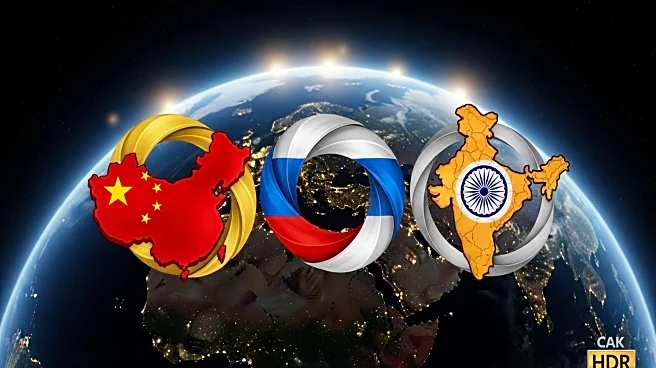What's Happening?
In a significant geopolitical development, the leaders of China, Russia, and India convened at a summit in eastern China, showcasing a display of unity. President Xi Jinping of China, President Vladimir Putin of Russia, and Prime Minister Narendra Modi of India were seen engaging warmly, with gestures such as handshakes and shared laughter. This meeting is perceived as a strategic move to present a united front among the three major powers not aligned with the West. The summit's optics suggest a challenge to the United States' influence, particularly in light of recent tensions between the U.S. and India over trade tariffs. Analysts interpret this gathering as a signal of an alternative world order, with these nations seeking to strengthen ties amidst global political shifts.
Why It's Important?
The summit underscores a potential realignment in global power dynamics, with China, Russia, and India positioning themselves as a counterbalance to Western influence. This development could have significant implications for international relations, trade, and security. For the U.S., this alliance may complicate diplomatic efforts and economic strategies, especially if India, a key player in the Indo-Pacific region, strengthens ties with China and Russia. The meeting also highlights the importance of diplomatic optics, as these nations seek to convey solidarity and mutual interests in the face of Western policies. The potential shift in alliances could impact global trade routes, security agreements, and economic partnerships, affecting stakeholders across various sectors.
What's Next?
The summit may prompt the U.S. and its allies to reassess their diplomatic and economic strategies in the region. Potential reactions could include efforts to engage more deeply with India to counterbalance its ties with China and Russia. Additionally, the U.S. might consider revisiting trade policies and tariffs that have strained relations with India. The meeting could also lead to further collaborations among China, Russia, and India in areas such as energy, technology, and defense, potentially reshaping regional and global alliances. Observers will be watching for any formal agreements or joint initiatives that emerge from this summit, which could signal a more structured alliance among these nations.
Beyond the Headlines
The summit raises questions about the long-term implications of a closer alliance between China, Russia, and India. Ethically, this alignment could challenge Western narratives on democracy and human rights, as these nations have differing views on governance and civil liberties. Culturally, the collaboration may influence global cultural exchanges and soft power dynamics. Legally, the alliance could impact international law, particularly in areas like trade regulations and territorial disputes. The potential for a new geopolitical bloc could lead to shifts in global governance structures, affecting international organizations and multilateral agreements.










